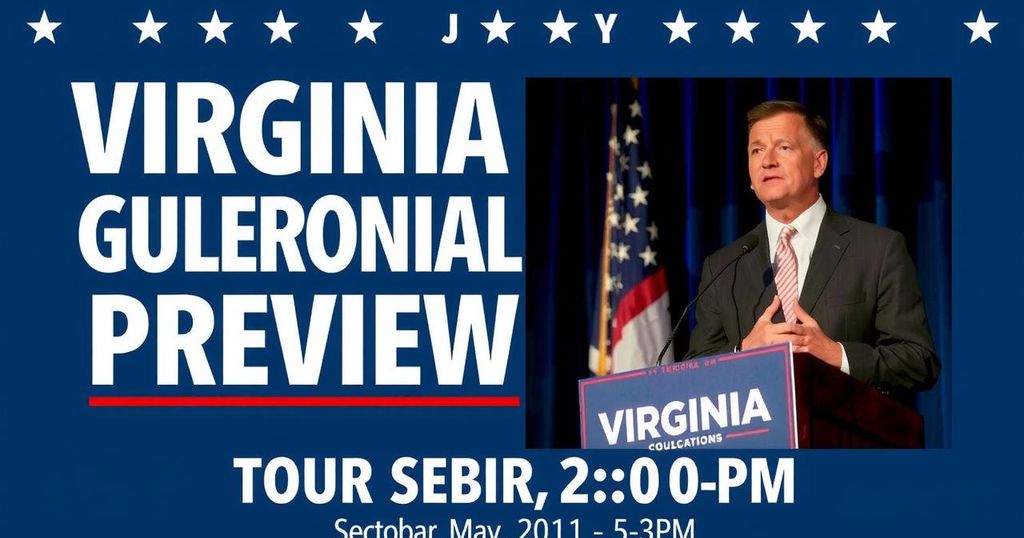An Overview of the Virginia Gubernatorial Election and Voting Trends

The Virginia gubernatorial election is set for June 17, 2025, with Abigail Spanberger running unopposed for the Democratic nomination and Winsome Sears contesting for the Republican nomination alongside Merle Rutledge. Virginia’s gubernatorial races typically feature low competition, with historical trends indicating the possibility of party shifts based on past presidential election outcomes. In addition, Alaska retained its ranked-choice voting system amid wider rejection across states, highlighting ongoing electoral debates.
The Virginia gubernatorial election is set for June 17, 2025, with significant implications for both major parties. As of now, only three candidates have declared their intention to run: Abigail Spanberger (D), who is unchallenged in her primary, and two Republicans, Winsome Sears and Merle Rutledge, competing for their party’s nomination. Spanberger emphasizes childcare affordability, highlighting the struggles many parents face. Meanwhile, Sears, the incumbent Lt. Governor, focuses on advocating for the right-to-work legislation in Virginia.
Historically, Virginia’s gubernatorial primaries have been relatively uncontested. In the Democratic Party, Spanberger’s unopposed status mirrors past instances where Democratic candidates have run without competition. The record reflects three primaries with competitive races, notable for Ralph Northam’s narrow victory in 2017. In contrast, Republicans have also experienced unopposed primaries with varying degrees of competitiveness; the 2017 primary was particularly close.
The overarching political landscape in Virginia reveals a tendency for the party that loses the presidential election to gain control of the governorship. If the Democrats prevail in 2025, it would mark a return to governorship since Ralph Northam’s departure in 2022, while a Republican victory would establish consecutive terms for the party since the 1990s.
Additionally, Alaska recently affirmed its ranked-choice voting (RCV) system through a recount, maintaining its adoption after prior implementation. In the wake of this, various states rejected similar measures, reflecting a divided national sentiment towards RCV. Proponents assert that efforts toward electoral reforms face significant opposition.
On a broader scale, between 2014 and 2023, an average of 16% of officials targeted for recall were removed from their positions, indicating notable political risks for officials amid growing recall movements. This upcoming year, Ballotpedia will release a detailed analysis of recall efforts, highlighting the significant political implications of these trends on governance.
The Virginia gubernatorial election process is significant as incumbents are barred from seeking reelection due to term limits, creating an opportunity for new leadership. This election cycle will feature primaries that have historically seen varying degrees of competition, especially noted in the context of the Democratic and Republican parties. Furthermore, the landscape of ranked-choice voting is evolving, particularly after Alaska’s retention of RCV, amidst a backdrop of rising national sentiment against its wider adoption. Also, the political dynamics surrounding recall elections have become increasingly prominent, with notable statistics available concerning officials targeted for removal. This article captures the essence of the Virginia gubernatorial race and the changes surrounding voting systems, illustrating the broader electoral landscape leading into future elections.
The forthcoming Virginia gubernatorial election promises to be a pivotal event for both political parties, especially given the current lack of competition within the Democratic primary. As the candidates prepare for the primaries, issues such as childcare costs and labor laws will dominate discussions. Concurrently, the dynamics surrounding ranked-choice voting reflect a divided national consensus, while recall elections introduce additional elements of unpredictability into political governance. Together, these factors underscore a vital period in Virginia’s political narrative and the nation’s electoral discussions.
Original Source: news.ballotpedia.org







